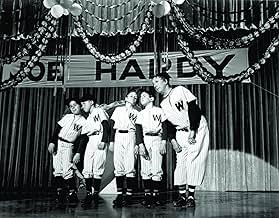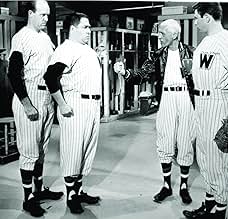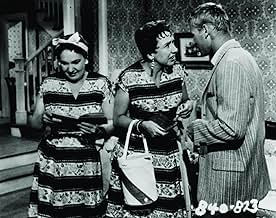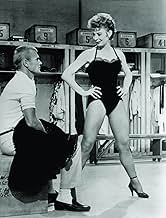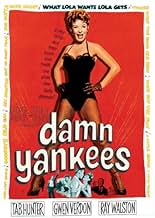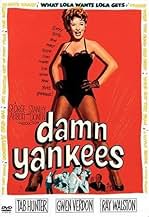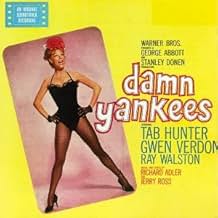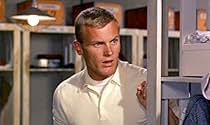IMDb RATING
7.0/10
3.7K
YOUR RATING
A frustrated fan of the hopeless Washington Senators makes a pact with the Devil to help the baseball team win the league pennant.A frustrated fan of the hopeless Washington Senators makes a pact with the Devil to help the baseball team win the league pennant.A frustrated fan of the hopeless Washington Senators makes a pact with the Devil to help the baseball team win the league pennant.
- Nominated for 1 Oscar
- 8 nominations total
Roy Sievers
- Joe Hardy - #2 - Washington Senators
- (archive footage)
William Adams
- Yankees Team Owner
- (uncredited)
Phil Arnold
- Newsstand Proprietor
- (uncredited)
Robert Banas
- Baseball Player
- (uncredited)
Benjie Bancroft
- Trial Spectator
- (uncredited)
John Barton
- Baseball Game Spectator
- (uncredited)
Yogi Berra
- Self - New York Yankee
- (archive footage)
- (uncredited)
Featured reviews
"Damn Yankees" is old-fashioned entertainment, a bit too talky and literal-minded, but great songs and great dancing never get old. It's worth plodding through the more mundane aspects of this film to relish the classic numbers. "Who's Got The Pain?" has nothing whatsoever to do with the plot, but it proves beyond question that Gwen Verdon is the prime interpreter of the Fosse dance style. "Whatever Lola Wants" is actually rather tame in comparison. The highlight is the smoky, seductive duet "Two Lost Souls," where Verdon lets loose with the greatest of ease. The surprise here is Tab Hunter, who holds his own and handles all the Fosse moves just fine. Jean Stapleton's Sister Miller is an early rehearsal for Edith Bunker. I personally prefer the other George Abbott/Stanley Donen collaboration "The Pajama Game," which is livelier. See them both.
All I'm going to do here is rave about a Broadway Legend. We have to be grateful for film, because otherwise some of the theater's greatest performers would exist only in memory. The film version of the 1955 Broadway smash is definitely Gwen Verdon's most memorable screen appearance - as the movie of CALL ME MADAM is probably the closest film approximation we have to what Ethel Merman was like on-stage, so DAMN YANKEES is for Gwen Verdon. No other film performance captures her presence and sparkle, the incredible movements her body was capable of - she's at her best here, and viewers familiar only with the comic roles she played later in her career will be amazed at this consummate musical comedy performer. She's completely infectious and delightful, even when she's not singing or dancing - the lady had PRESENCE, and she displays enough vulnerability to make us like a character who doesn't always do very likable things. She's elegant as she matter-of-factly explains her work methods in "A Little Brains, A Little Talent" and has a whopper of a dance duet with Bob Fosse called "Who's Got the Pain?" (they weren't married yet, but she was already becoming his favorite instrument of dance; his was a cameo appearance added to the film - on stage Verdon's partner was another of the show's characters - if you listen closely you'll hear Tab Hunter say "That was wonderful, Fosse!" at the number's conclusion). And she looks gorgeous in a series of colorful costumes, although in her signature number, "Whatever Lola Wants..." the costume grows skimpier and skimpier as she increases her efforts to seduce Tab Hunter. In THE BLUE ANGEL Marlene Dietrich's "Naughty Little Lola" used a chair as a prop to sing about "Falling in Love Again," (which would resonate decades later as Liza Minnelli sang about "Mein Herr")- in DAMN YANKEES Verdon uses a locker-room bench, and this "other Naughty Lola" ends up almost as scantily dressed! A word about Ray Walston's Mr. Applegate: He is NOT a nice guy!
This musical, when revived about a decade ago with Jerry Lewis as Applegate, was referred to as a fable for the Eisenhower Years. It is set in a faintly comfortable period (once the McCarthyite Persecutions were finished), because the concept of this musical was the preoccupation of the American public with the national pastime of baseball, and it's singular domination (between 1947 and 1962) by the New York Yankees. Although the Yankees had had other periods of greatness, with Ruth, Gehrig, "Murderers Row" in the late 1920s and early 1930s, they had to share the domination of the World Series with other teams in that period (the Philadelphia Athletics, the Detroit Tigers, and the St. Louis Cardinals, to name three). But the Yankees in this period started with Joe DiMaggio, entered into the period dominated by Mickey Mantel, Whitey Ford, Billy Martin, Yogi Berra, Phil Rizzuto, Don Larsen, Roger Maris, and presided over by Casey Stengel. They did not always win (one memorable defeat was by their perennial enemy the Brooklyn Dodgers in 1955), but they won so often that to non-baseball fans it was monotonous to follow the sports news: you knew what should finally happen.
So the background of this baseball era is important to understand the musical (one of the few times the actual historical background of the time the musical was created becomes that important). Joe Boyd (Robert Shafer) is a fanatical baseball lover and fan of the woebegone Washington Senators (the saying for many years about the Senators was, "First in war, first in peace, and last in their league."). The team had only one great moment: in 1924 they won the World Series when the team had one of baseball's greatest players on it - Walter Johnson. But it never really was in competition again after that. But Boyd is a fan, and he makes the mistake of being willing to sell his soul to allow the Senators a chance to win the series again. Enter Mr. Applegate (a.k.a. the Devil) played fiendishly well by Ray Walston. He offers Joe a contract that will make Joe the greatest baseball player of all time - and lead to the world series - in return for his soul. Hesitant at first, Joe agrees. He is transformed into Joe Hardy (Tab Hunter), and proceeds to try to join the Senators (with Applegate as his agent).
The Devil can never be trusted in any agreement. Applegate hopes to cause a wave of hope and hysteria by the anti-Yankee baseball public, letting Joe lead his team to the World Series. He plans to pull the rug from underneath the team at the final moment. Unfortunately Joe is a good salesman on his own, and has insisted on an escape clause for himself. Applegate has to accept it for the sake of his own plans. The escape clause is there because Joe loves his wife Meg (Sharon Bolin) and does not want her to be hurt. So Applegate decides to recruit his best female agent, Lola (Gwen Vernon) to vamp Joe and make him forget Meg. But Joe is too faithful, and succeeds in overcoming Lola's "irrisistable" personality (as she sings, "Whatever Lola wants, Lola gets" - except here). Lola, shaken by the experience, becomes a type of groupie for Joe - and eventually starts a mini-revolt on her own against Applegate.
The score of the show is memorable. Besides the key song "Heart" (sung by the Washington team players), and Lola's "Whatever" number, there is also "Two Lost Souls", "Goodbye Old Girl" and Walston's wonderful "Those were the good old days!" (when he fondly recalls all the tragedies he created in the history of mankind - including the day Jack the Ripper was born). Walston was not nominated for any awards for the movie performance*, but his Applegate is one of his best film performances, with his Gillis in SOUTH PACIFIC. He had played both on Broadway first, so we are lucky to have his film performances here.
*(But won the Tony Award for the role on stage.)
Stanley Donan co-directed this film with George Abbott. Abbott was usually a stage director (he had done the musical on Broadway). There is a moment when it is apparent that he is directing. There is a small dance done by one of the three ball players in the "Heart" number, and the close-up of the player as he smiles shyly and steps forward is out of place in the film - but would have worked on stage.
So the background of this baseball era is important to understand the musical (one of the few times the actual historical background of the time the musical was created becomes that important). Joe Boyd (Robert Shafer) is a fanatical baseball lover and fan of the woebegone Washington Senators (the saying for many years about the Senators was, "First in war, first in peace, and last in their league."). The team had only one great moment: in 1924 they won the World Series when the team had one of baseball's greatest players on it - Walter Johnson. But it never really was in competition again after that. But Boyd is a fan, and he makes the mistake of being willing to sell his soul to allow the Senators a chance to win the series again. Enter Mr. Applegate (a.k.a. the Devil) played fiendishly well by Ray Walston. He offers Joe a contract that will make Joe the greatest baseball player of all time - and lead to the world series - in return for his soul. Hesitant at first, Joe agrees. He is transformed into Joe Hardy (Tab Hunter), and proceeds to try to join the Senators (with Applegate as his agent).
The Devil can never be trusted in any agreement. Applegate hopes to cause a wave of hope and hysteria by the anti-Yankee baseball public, letting Joe lead his team to the World Series. He plans to pull the rug from underneath the team at the final moment. Unfortunately Joe is a good salesman on his own, and has insisted on an escape clause for himself. Applegate has to accept it for the sake of his own plans. The escape clause is there because Joe loves his wife Meg (Sharon Bolin) and does not want her to be hurt. So Applegate decides to recruit his best female agent, Lola (Gwen Vernon) to vamp Joe and make him forget Meg. But Joe is too faithful, and succeeds in overcoming Lola's "irrisistable" personality (as she sings, "Whatever Lola wants, Lola gets" - except here). Lola, shaken by the experience, becomes a type of groupie for Joe - and eventually starts a mini-revolt on her own against Applegate.
The score of the show is memorable. Besides the key song "Heart" (sung by the Washington team players), and Lola's "Whatever" number, there is also "Two Lost Souls", "Goodbye Old Girl" and Walston's wonderful "Those were the good old days!" (when he fondly recalls all the tragedies he created in the history of mankind - including the day Jack the Ripper was born). Walston was not nominated for any awards for the movie performance*, but his Applegate is one of his best film performances, with his Gillis in SOUTH PACIFIC. He had played both on Broadway first, so we are lucky to have his film performances here.
*(But won the Tony Award for the role on stage.)
Stanley Donan co-directed this film with George Abbott. Abbott was usually a stage director (he had done the musical on Broadway). There is a moment when it is apparent that he is directing. There is a small dance done by one of the three ball players in the "Heart" number, and the close-up of the player as he smiles shyly and steps forward is out of place in the film - but would have worked on stage.
The smash hit Broadway musical Damn Yankees was transferred to the screen with all but one of its original Broadway cast, its original director, and its original choreographer intact. This has both good and bad consequences. The good is that the great performances of the cast and the dynamic, sexy choreography of a young Bob Fosse are preserved for posterity. Although top billing is given to the one non-Broadway holdover, Tab Hunter, the real star of the film is the incredible Gwen Verdon recreating her spellbinding, Tony-winning turn as Lola. With comic timing, energy, sex appeal and incredible dancing ability to spare, it's impossible to succumb to her charms when she takes the stage... er, screen in her numbers "A Little Brains, A Little Talent," "Who's Got the Pain" (In a delightful pairing with Fosse himself), "Two Lost Souls," and especially the classic "Whatever Lola Wants," and, as another reviewer noted, it's amazing that this didn't lead to a longer and more rewarding movie career. She had a brilliant career for years after on Broadway but it still is a shame that more of her work wasn't preserved. Ray Walston is hammy but devishly (Sorry about the pun) delightful as Applegate, and the supporting cast, including Jean Stapleton, is all fine. Nobody can really sing, but they inject the performances of their songs with such zest, energy and sweet sincerity that it doesn't really matter. The only problem is that, even though George Abbot, the original Broadway director, is paired witht he more cinematically knowledgeable Stanley Donen, everything is very stagey and there isn't much effort to open the action out. But when Verdon is working her magic, it's pretty hard to care, so that seems like a stupid quibble. So kick back, relax and enjoy Damn Yankees. It may not be the most inventive movie musical ever, but it's got a little brians, a little talent, plenty of heart, and Gwen Verdon. Who could ask for anything more?
Gwen Verdon was a Broadway legend with long gorgeous legs and an undeniable stage and screen charisma. Her legendary stage career earned her four Tony Awards, thanks in no small part to her long time Svengali and ex-husband Bob Fosse. Sadly, the only time Verdon was allowed to bring a role she created on Broadway to the big screen was in DAMN YANKEES, a sparkling film adaptation of the Richard Ross-Jerry Adler musical about a middle-aged baseball fan named Joe Boyd (Robert Shafer)who sells his soul to the devil for his favorite team, the Washington Senators, to win the pennant. The devil, apparently in desperate need of converts, appears in Joe's living room in the form of a Mr. Applegate (Ray Walston)and changes Joe Boyd into Joe Hardy (Tab Hunter), a young and unbeatable baseball player who helps lead the Senators to the pennant until he starts to get homesick and Applegate sends in his # 1 agent/witch named Lola (Verdon) to distract Joe. The film is well-mounted by Broadway legend George Abbott and Verdon and Ralston effectively reprise their Tony-Award winning stage roles and Fosse is even showcased, dancing in a rare duet with wife Verdon on "Who's Got the Pain?" and trust and believe, seeing Fosse and Verdon dance together is worth the price of admission alone. Other great songs in the score include "Whatever Lola Wants", "Heart","Those Were the Good Old Days", and "Shoeless Joe From Hannibal Mo". Not the greatest musical ever made, but Verdon, Ralston, and Fosse's brilliant choreography make it worth watching and re-watching.
Did you know
- TriviaGwen Verdon's dance partner in "Who's Got the Pain?" is Bob Fosse, who was restaging his stage choreography for the film, and took the opportunity to step into the number, which became a rare and treasured opportunity for Broadway fans to see the artist and his muse perform together. Verdon and Fosse married in 1960.
- GoofsWhen Joe is introduced to the manager and the reporter at the ballpark, there is a palm tree in the background, although the scene takes place in Washington DC.
- ConnectionsFeatured in Diamonds on the Silver Screen (1992)
- SoundtracksSix Months Out of Every Year
Music by Richard Adler
Lyrics by Jerry Ross
Performed by Shannon Bolin, Robert Shafer, and chorus
- How long is Damn Yankees?Powered by Alexa
Details
- Release date
- Country of origin
- Language
- Also known as
- Cette satanée Lola
- Filming locations
- Production companies
- See more company credits at IMDbPro
- Runtime
- 1h 51m(111 min)
- Aspect ratio
- 1.85 : 1
Contribute to this page
Suggest an edit or add missing content


